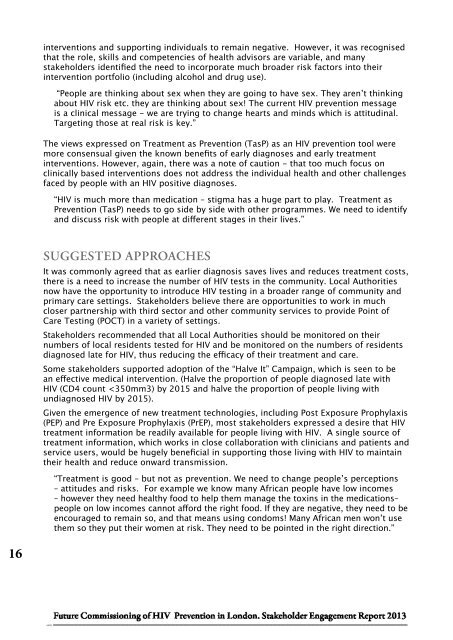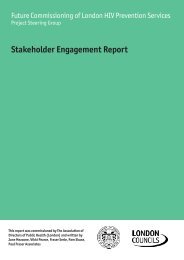Stakeholder Engagement Report - London Councils
Stakeholder Engagement Report - London Councils
Stakeholder Engagement Report - London Councils
You also want an ePaper? Increase the reach of your titles
YUMPU automatically turns print PDFs into web optimized ePapers that Google loves.
interventions and supporting individuals to remain negative. However, it was recognised<br />
that the role, skills and competencies of health advisors are variable, and many<br />
stakeholders identified the need to incorporate much broader risk factors into their<br />
intervention portfolio (including alcohol and drug use).<br />
“People are thinking about sex when they are going to have sex. They aren’t thinking<br />
about HIV risk etc. they are thinking about sex! The current HIV prevention message<br />
is a clinical message - we are trying to change hearts and minds which is attitudinal.<br />
Targeting those at real risk is key.”<br />
The views expressed on Treatment as Prevention (TasP) as an HIV prevention tool were<br />
more consensual given the known benefits of early diagnoses and early treatment<br />
interventions. However, again, there was a note of caution - that too much focus on<br />
clinically based interventions does not address the individual health and other challenges<br />
faced by people with an HIV positive diagnoses.<br />
“HIV is much more than medication – stigma has a huge part to play. Treatment as<br />
Prevention (TasP) needs to go side by side with other programmes. We need to identify<br />
and discuss risk with people at different stages in their lives.”<br />
Suggested Approaches<br />
It was commonly agreed that as earlier diagnosis saves lives and reduces treatment costs,<br />
there is a need to increase the number of HIV tests in the community. Local Authorities<br />
now have the opportunity to introduce HIV testing in a broader range of community and<br />
primary care settings. <strong>Stakeholder</strong>s believe there are opportunities to work in much<br />
closer partnership with third sector and other community services to provide Point of<br />
Care Testing (POCT) in a variety of settings.<br />
<strong>Stakeholder</strong>s recommended that all Local Authorities should be monitored on their<br />
numbers of local residents tested for HIV and be monitored on the numbers of residents<br />
diagnosed late for HIV, thus reducing the efficacy of their treatment and care.<br />
Some stakeholders supported adoption of the “Halve It” Campaign, which is seen to be<br />
an effective medical intervention. (Halve the proportion of people diagnosed late with<br />
HIV (CD4 count




